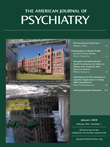Selected Infectious Agents and Risk of Schizophrenia Among U.S. Military Personnel
Abstract
Objective: A number of studies have reported associations between Toxoplasma gondii ( T. gondii ) infection and the risk of schizophrenia. Most existing studies have used small populations and postdiagnosis specimens. As part of a larger research program, the authors conducted a hypothesis-generating case control study of T. gondii antibodies among individuals discharged from the U.S. military with a diagnosis of schizophrenia and serum specimens available from both before and after diagnosis. Method: The patients (N=180) were military members who had been hospitalized and discharged from military service with a diagnosis of schizophrenia. Healthy comparison subjects (3:1 matched on several factors) were members of the military who were not discharged. The U.S. military routinely collects and stores serum specimens of military service members. The authors used microplate-enzyme immunoassay to measure immunoglobulin G (IgG) antibody levels to T. gondii , six herpes viruses, and influenza A and B viruses and immunoglobulin M (IgM) antibody levels to T. gondii in pre- and postdiagnosis serum specimens. Results: A significant positive association between the T. gondii IgG antibody and schizophrenia was found; the overall hazard ratio was 1.24. The association between IgG and schizophrenia varied by the time between the serum specimen collection and onset of illness. Conclusion: The authors found significant associations between increased levels of scaled T. gondii IgG antibodies and schizophrenia for antibodies measured both prior to and after diagnosis.



